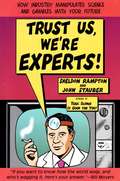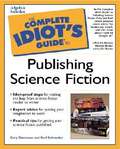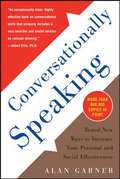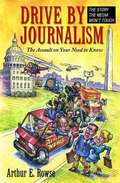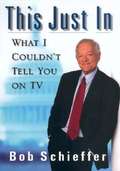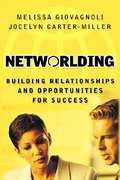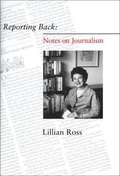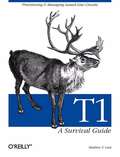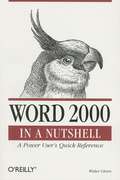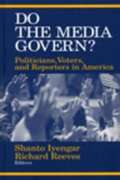- Table View
- List View
The Americanization of Edward Bok: The Autobiography of a Dutch boy Fifty Years After
by Edward BokEdward William Bok (born Eduard Willem Gerard Cesar Hidde Bok) (October 9, 1863 – January 9, 1930) was a Dutch-born American editor and Pulitzer Prize-winning author. He was editor of the Ladies' Home Journal for 30 years (1889-1919). <P><P> Pulitzer Prize Winner
I Remember
by Dan RatherDan Rather's memoir about growing up in Texas during the late 1930s and early 1940s is a portrait of family and community life during that time and of a country just recovering from the Great Depression and on the brink of World War II.
What We Had: A Memoir
by James ChaceIn an affectionate memoir of growing up amid genteel proverty, Chace describes the events, nostalgia, and obsessions that shaped his childhood, his eccentric relatives, his Harvard education, his stint as a CIA informat, and his later career
Trust Us, We're Experts
by Sheldon Rampton John StauberFearless investigative journalists Sheldon Rampton and John Stauber ( Toxic Sludge Is Good for You! and Mad Cow U.S.A.) are back with a gripping expos of the public relations industry and the scientists who back their business-funded, anti-consumer-safety agendas. There are two kinds of "experts" in question--the PR spin doctors behind the scenes and the "independent" experts paraded before the public, scientists who have been hand-selected, cultivated, and paid handsomely to promote the views of corporations involved in controversial actions. Lively writing on controversial topics such as dioxin, bovine growth hormone, and genetically modified food makes this a real page-turner, shocking in its portrayal of the real and potential dangers in each of these technological innovations and of the "media pseudo-environment" created to obfuscate the risks. By financing and publicizing views that support the goals of corporate sponsors, PR campaigns have, over the course of the century, managed to suppress the dangers of lead poisoning for decades, silence the scientist who discovered that rats fed on genetically modified corn had significant organ abnormalities, squelch television and newspaper stories about the risks of bovine growth hormone, and place enough confusion and doubt in the public's mind about global warming to suppress any mobilization for action. Rampton and Stauber introduce the movers and shakers of the PR industry, from the "risk communicators" (whose job is to downplay all risks) and "outrage managers" (with their four strategies--deflect, defer, dismiss, or defeat) to those who specialize in "public policy intelligence" (spying on opponents). Evidently, these elaborate PR campaigns are created for our own good. According to public relations philosophers, the public reacts emotionally to topics related to health and safety and is incapable of holding rational discourse. Needless to say, Rampton and Stauber find these views rather antidemocratic and intend to pull back the curtain to reveal the real wizard in Oz. This is one wake-up call that's hard to resist.
The Complete Idiot's Guide to Publishing Science Fiction
by Cory Doctorow Karl SchroederYou'd like to write science fiction. Maybe you already write the stuff but haven't had any sales yet. This section can help you start out on the road to success. <P><P> There are two things you must accomplish to become a successful SF writer: become a writer of entertaining and thought-provoking stories, and market those stories successfully to a large audience. <P><P> We'll look at how you can take steps toward both these goals, by easing you into the process of writing, and showing you how to plug into the SF writing and reading communities. <P><P> The author of this book donated a digital copy to Bookshare.org. Join us in thanking Cory Doctorow for providing his accessible digital book to this community.
Conversationally Speaking: Tested New Ways To Increase your Personal and Social Effectiveness
by Alan GarnerMore than a million people have learned the secrets of effective conversation using Conversationally Speaking. This revised edition provides more ways to improve conversational skills by asking questions that promote conversation, learning how to listen so that others will be encouraged to talk, reducing anxiety in social situations and more.
Confederacy of Silence: A True Tale of the New Old South
by Richard RubinDiscussion of the New South by a news correspondent on a Southern paper.
Drive-By Journalism: The Assault on Your Need to Know
by Arthur RowseA sobering look at the effect of mega-corporate media dominance; puts the lie to the myth of liberal bias in the mass media.
What the People Know: Freedom and the Press
by Richard ReevesDiscusses the press and how it does and doesn't work and what needs to happen to improve things.
Censorship, Inc.: The Corporate Threat to Free Speech in the United States
by Lawrence SoleyThe First Amendment of the U.S. Constitution is a landmark in the defense of free speech against government interference and suppression. In this book we come to see how it also acts as a smokescreen behind which a more dangerous and insidious threat to free speech can operate. Soley shows how as corporate power has grown and come to influence the issues on which ordinary Americans should be able to speak out, so new strategies have developed to restrict free speech on issues in which corporations and property-owners have an interest. Censorship, Inc. is a comprehensive examination of the vast array of corporate practices which restrict free speech in the United States today in fields as diverse as advertsing and the media, the workplace, community life, and the environment. Soley also shows how these threats to free speech have been resisted by activism, legal argument, and through legislation. Grounded in extensive research into actual cases, this book is at the same time a challenge to conventional thinking about the nature of censorship and free speech.
This Just In: What I couldn't Tell You On TV
by Bob SchiefferFrom Publishers Weekly It might not have occurred to anyone to clamor for longtime CBS reporter Schieffer's memoir, but now that it's in print, it makes for a highly engaging read. He's seen it all and has much wisdom about journalism and governance to impart. The book spans virtually every important domestic story of the past 40-odd years; among his captivating subjects are the 1962 integration of the University of Alabama, JFK's assassination, Vietnam, Nixon-era peace protests and Watergate. The book's emphasis changes subtly from events to personalities when Schieffer takes over Face the Nation. As the subtitle suggests, Schieffer wisely forgoes rehashing familiar tales like Watergate or the Clinton-Lewinsky scandal in favor of revealing the background action that went unreported at the time. He structures the book as a collection of anecdotes, and, unsurprisingly for such a seasoned pro, Schieffer has a sharp eye for intriguing details and an instinct for maintaining the proper focus on his subjects rather than on himself. When he does get personal, he admirably questions his occasional missteps in balancing family and career. The telling is so unfussy, modest and straightforward that it rarely prompts speculation about the juicy bits that he couldn't write in a book. Indeed, the work succeeds not only as America over the past 40 years.
Semantics and Communication
by John C. Condon Jr.New to the third edition is an exploration of creativity and problem solving in terms of semantics.
Networlding: Building Relationships and Opportunities for Success
by Melissa Giovagnoli Jocelyn Carter-MillerHow to buid the mutually beneficial relationships that are the real keys to job satisfaction, career advancement, and personal fulfillment in the 21st century.
Reporting Back: Notes on Journalism
by Lillian RossI would encourage anyone who is doing any kind of writing to read the introduction to this book. Ross is a talented and ethical journalist who can teach students and writers a lot in those first few pages. An entertaining and informative book.
T1: A Survival Guide
by Matthew GastThis practical, applied reference to T1 for system and network administrators brings together in one place the information you need to set up, test, and troubleshoot T1. You'll learn what components you need to build a T1 line; how the components interact to transmit data; how to adapt the T1 to work with data networks using standardized link layer protocols; troubleshooting strategies; and working with vendors.
Our Woman in Kabul
by Irris MaklerOne of the first journalists into Afghanistan after the September 11 attacks, Irris Makler set out to cover a war and discovered a story about women caught in the crossfire.
Word 2000 in a Nutshell
by Walter GlennWord 2000 in a Nutshellis a clear, concise, and complete reference to the most popular word-processing program in the world. This book is the first choice of the Word power user who needs help completing a specific task or understanding a command or topic. It's also an invaluable resource that uncovers Word 2000's undocumented features and shares powerful time-saving tips.
Do the Media Govern? Politicians, Voters, and Reporters in America
by Shanto Iyengar Richard ReevesEssays.
Java Message Service
by Dave Chappell Richard Monson-HaefelThis book is a thorough introduction to Java Message Service (JMS) from Sun Microsystems. It shows how to build applications using the point-to-point and publish-and-subscribe models; use features like transactions and durable subscriptions to make applications reliable; and use messaging within Enterprise JavaBeans. It also introduces a new EJB type, the MessageDrivenBean, that is part of EJB 2.0, and discusses integration of messaging into J2EE.


